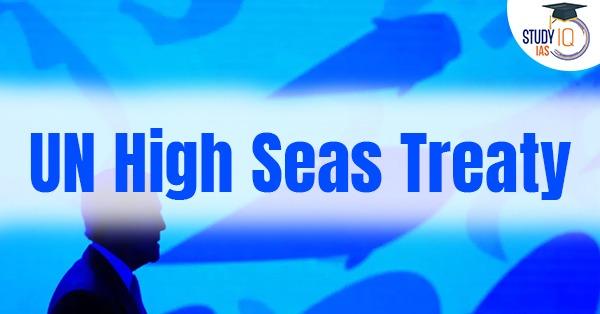Table of Contents
What is the UN High Seas Treaty?
- The UN High Seas Treaty is also referred to as the ‘Paris Agreement for the Ocean’.
- The UN High Seas Treaty was to be negotiated under the United Nations Convention on Laws of the Sea (UNCLOS) of 1982 which governs the rights of countries regarding marine resources.
- Some aspects of negotiations under the UN High Seas Treaty: Establishing marine protected areas to put limits on certain activities, environmental impact assessments or clearances for the sustainability of works, financial support to countries, and sharing other scientific knowledge.
UN High Seas Treaty: News
- In June, UN Secretary-General Antonio Guterres had declared an “ocean emergency” at the UN Ocean Conference in Lisbon, Portugal, citing threats to the world’s oceans.
- When the latest round of talks began two weeks ago in New York, it was hoped that an agreement would be arrived at for the conserving marine life at the ‘high seas’ which lie outside the exclusive jurisdiction of different countries.
What are the High Seas?
- The Convention on the UN High Seas Treaty, signed in 1958, defined “high seas” to mean “all parts of the sea that are not included in the territorial sea or in the internal waters of a State” and where “no State may validly purport to subject any part of them to its “
- These are the waters beyond the Exclusive Economic Zones (EEZ). Also referred to as open seas or international waters.
- The high seas are open to all States, whether coastal or land-locked.

Why there is a Need for UN High Seas Treaty?
- Absence of a dedicated law for high seas: Although some treaties, along with the UNCLOS, regulate the conduct of actors on the high seas, but a treaty dedicated to protecting high seas and ocean health does not exist as of now.
- And currently, there is no legal mechanism to establish marine protected areas (MPAs) on the high seas, nor a global framework to conduct environmental impact assessments for activities in those waters.
- Over exploitation: As every country has the right to access high seas, resulting in large-scale drilling and trawling leading to overfishing and unregulated deep-sea mining.
- Critical to the planet: High seas support diverse marine life and ecosystems that are critical to the health of the ocean, climate, planet and people. Also, the high seas are vulnerable to the impacts of climate change, plastic pollution, and other human activities.
UN High Seas Treaty: Why Negotiations have Failed?

























 WhatsApp
WhatsApp